
Zorinski is a 1795 historical tragedy by the British writer Thomas Morton. It first appeared at the Theatre Royal, Haymarket in London with a cast that included William Barrymore as Zorinski, James Aickin as Casimir, King of Poland, Robert Bensley as Rodomsko, Charles Kemble as Radanzo, John Bannister as Zarno, John Henry Johnstone as O'Curragh, Richard Suett as Amalekite, John Fawcett as Witski, Thomas Caulfield as Naclo, Elizabeth Kemble as Rosolia and Maria Bland as Winifred. It included music composed by Samuel Arnold. The Irish premiere was at the Crow Street Theatre in Dublin on 28 November 1795. It is also known by the alternative title Casimir, King of Poland

Fashionable Levities is a 1785 comedy play by the Irish writer Leonard MacNally. It premiered at the Theatre Royal, Covent Garden in London on 7 April 1785. The original cast included William Thomas Lewis as Welford, John Quick as Sir Buzzard Savage, Richard Wroughton as Captain Douglas, Ralph Wewitzer as Colonel Staff, John Edwin as Nicholas, John Henderson as Mr Ordeal, Margaret Martyr as Clara, Sarah Maria Wilson as Grace and Mrs Webb as Honour. MacNally dedicated the play to the Anglo-Irish aristocrat the Countess of Salisbury. The Dublin premiere took place at the Crow Street Theatre on 5 April 1786.

Know Your Own Mind is a 1777 comedy play by the Irish writer Arthur Murphy. It premiered at the Theatre Royal, Covent Garden on 22 February 1777. The original Covent Garden cast included William Thomas Lewis as Millamour, Charles Lee Lewes as Dashwould, Richard Wroughton as Malvil, Francis Aickin as Bygrove, Cockran Joseph Booth as Captain Bygrave, James Fearon as Sir John Millamour, John Whitfield as Sir Harry Lovewith, Ralph Wewitzer as Charles, Servant of Millamour, Isabella Mattocks as Lady Bell, Mary Dayes as Lady Jane and Elizabeth Hartley as Miss Neville. The Irish premiere was at the Crow Street Theatre in Dublin on 13 August 1778. It was acted nineteen times at Covent Garden and in 1789 was revived at Drury Lane, with Dorothea Jordan in the cast, and remained a standard work well into the nineteenth century.

A Day in Turkey is a 1791 comedy by the English author Hannah Cowley. It premiered at the Theatre Royal, Covent Garden in London on 3 December 1791. The original cast included Joseph George Holman as Ibrahim, William Farren as Orloff, John Fawcett as A La Greque, Joseph Shepherd Munden as Mustapha, William Cubitt as Azim, Charles Incledon as Selim, William Macready as Muley, Charles Farley as Ismael, James Thompson as Old Man, Jane Pope as Alexina, Harriet Pye Esten as Paulina, Isabella Mattocks as Lauretta and Margaret Martyr as Fatima. The Irish premiere took place at the Crow Street Theatre in Dublin on 16 May 1792

The Iron Chest is a 1796 play by the British writer George Colman the Younger, with music by the composer Stephen Storace. Inspired by the novel Things as They Are by William Godwin, it premiered at the Theatre Royal, Drury Lane in London on 12 March 1796. The original cast included John Philip Kemble as Sir Edward Mortimer, Richard Wroughton as Fitzharding, John Bannister as Wilford, James William Dodd as Adam Winterton, William Barrymore as Rawbold, Richard Suett as Samson Rawbold, Robert Palmer as Orson, Charles Bannister as Third Robert, Elizabeth Farren as Lady Helen, Maria Gibbs as Blanch, Charlotte Tidswell as Dame Rawbold, Nancy Storace as Barbara and Maria Theresa Kemble as Judith. The Irish premiere took place at the Crow Street Theatre in Dublin on 6 March 1797.
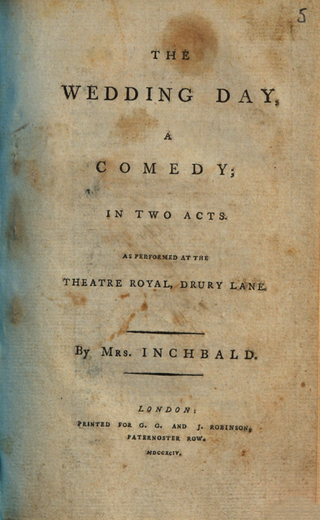
The Wedding Day is a comedy play by the English writer Elizabeth Inchbald. An afterpiece, it premiered at the Theatre Royal, Drury Lane in London on 1 November 1794. The original cast included William Barrymore as Lord Rakeland, Thomas King as Sir Adam Contest, John Hayman Packer as Mr Millden, Charles Kemble as Mr Contest, Charlotte Tidswell as Lady Autumn, Dorothea Jordan as Lady Contest, Elizabeth Hopkins as Mrs Hamford and Elizabeth Heard as Hannah. The Irish premiere took place at the Crow Street Theatre in Dublin on 15 February 1797.
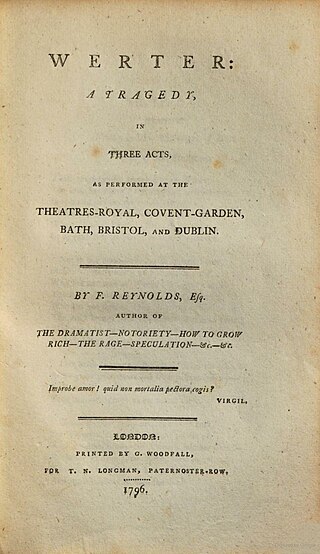
Werter is a 1785 tragedy by the British writer Frederick Reynolds. His debut play, it was inspired by the 1774 novel The Sorrows of Young Werther by Johann Wolfgang von Goethe. It first appeared at the Theatre Royal, Bath on 25 November 1785. Its London premiere came at the Theatre Royal, Covent Garden on 14 March 1786. The original Covent Garden cast included Joseph George Holman as Werter, William Davies as Sebastian, James Fearon as Leuthrop, William Farren as Albert and Ann Brunton as Charlotte. The Dublin premiere was at the Smock Alley Theatre on 2 December 1786.
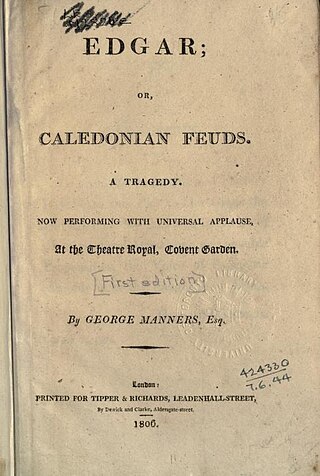
Edgar; Or, Caledonian Feuds is an 1806 historical tragedy by the British writer George Manners. I was inspired by Ann Radcliffe's novel The Castles of Athlin and Dunbayne. It premiered at the Theatre Royal, Covent Garden in London on 9 May 1806. The original cast included Sarah Smith as Edgar, Henry Erskine Johnston as Osbert, Alexander Pope as Baron, William Chapman as Malcolm, William Claremont as Count Zulmio, Charles Klanert as Officer, Nannette Johnston as Matilda and Louisa Brunton as Emma. The Irish premiere took place at the Crow Street Theatre in Dublin on 30 April 1808.
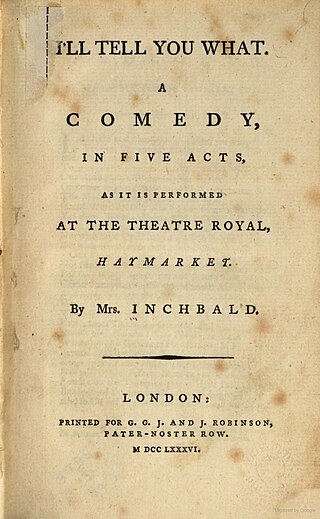
I'll Tell You What is a 1785 comedy play by the English writer Elizabeth Inchbald. It premiered at the Theatre Royal, Haymarket in London on 4 August 1785. The original cast included John Palmer as Major Cyprus, Robert Bensley as Anthony Euston, James Aickin as Colonel Downright, James Brown Williamson as Sir George Euston, John Bannister as Charles Euston, Robert Palmer as Sir Harry Harmless, William Parsons as Mr Euston, Mary Bulkley as Lady Euston and Elizabeth Farren as A Young Lady. The Irish premiere took place at the Smock Alley Theatre in Dublin on 12 December 1785.

He Would Be a Soldier is a 1786 comedy play by the Irish writer Frederick Pilon. It premiered at the Theatre Royal, Covent Garden on 18 November 1786. The original cast included Francis Aickin as Colonel Talbot, John Quick as Sir Oliver Oldstock, William Thomas Lewis as Captain Crevelt, William Farren as Mandeville, Ralph Wewitzer as Count Pierpoint, James Fearon as Wilkins, John Edwin as Caleb, James Thompson as Caleb, Elizabeth Pope as Charlotte, Lydia Webb as Lady Oldstock and Mary Wells as Harriet. The Irish premiere took place at the Smock Alley Theatre in Dublin on 2 January 1787

The Disbanded Officer; Or, The Baroness of Bruschal is a 1786 comedy play by James Johnstone, inspired by the 1763 German play Minna von Barnhelm by Gotthold Ephraim Lessing. It premiered at the Theatre Royal, Haymarket in London on 24 July 1786. The original London cast included John Palmer as Colonel Holberg, John Bannister as Paul Warmans, Robert Baddeley as Katzenbuckel, William Parsons as Rohf, Charles Farley as Boy, Elizabeth Farren as Baroness of Bruschal, Mary Bulkley as Lisetta and Elizabeth Inchbald as Lady in Mourning. The Irish premiere took place at the Smock Alley Theatre in Dublin on 15 February 1787. Johnstone dedicated the publisher version to Queen Charlotte.

Tit for Tat is a 1786 comedy play by the British writer George Colman the Elder. It premiered at the Theatre Royal, Haymarket in London on 29 August 1786. The original Haymarket cast included John Palmer as Villamour, Cockran Joseph Booth as Old Meanwell, William Davies as Young Meanwell, Robert Palmer as Skipwell, Elizabeth Farren as Florinda and Mary Bulkley as Letty. The Irish premiere took place at the Smock Alley Theatre in Dublin on 26 February 1787 It also subsequently appeared at both the Covent Garden and Theatre Royal, Drury Lane theatres.
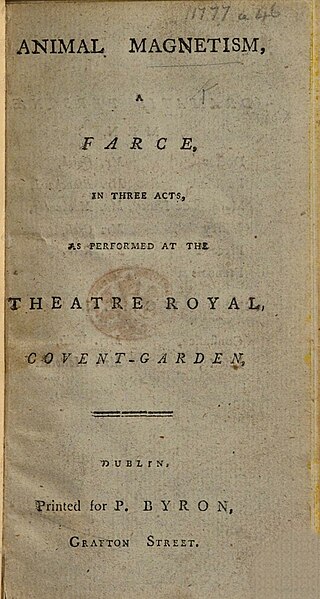
Animal Magnetism is a 1788 comedy play by the English writer Elizabeth Inchbald. A three-act farce, it premiered as an afterpiece at the Theatre Royal, Covent Garden in London on 22 May 1788. The original cast included John Quick as Doctor, William Blanchard as La Fleur, William Macready the Elder as Marquis De Lancey, Mary Wells as Constance and Isabella Mattocks as Lisette. The Irish premiere took place at the Crow Street Theatre in Dublin on 8 November 1788.
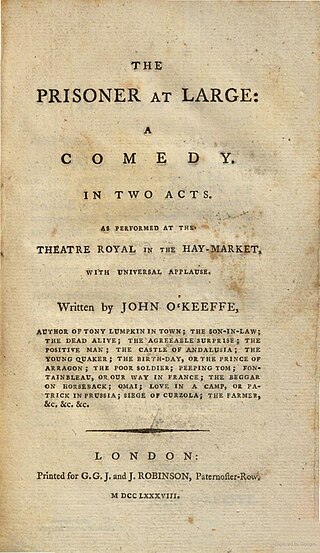
The Prisoner at Large is a 1788 comedy play by the Irish John O'Keeffe. A farce, it premiered as an afterpiece at the Theatre Royal, Haymarket in London on 2 July 1788. The original cast included James Brown Williamson as Lord Esmond, William Henry Moss as Old Dowdle, Ralph Wewitzer as Count Fripon, Robert Palmer as Jack Connor, John Phillimore as Frill, John Edwin as Muns and Elizabeth Kemble as Adelaide. The Irish premiere took place at the Crow Street Theatre in Dublin on 7 August 1789.

False Appearances is a 1789 comedy play by the British politician and general Henry Seymour Conway, inspired by the 1740 French play Trompeurs Dehors by Louis de Boissy. It appeared at the Theatre Royal, Drury Lane in London on 20 April 1789. The Irish premiere took place at the Crow Street Theatre in Dublin on 13 July 1789 The original Drury Lane cast included John Philip Kemble as Marquis, Richard Wroughton as Baron, William Parsons as Governor, John Bannister as Abbé, Robert Palmer as Robert, Elizabeth Farren as Countess, Anna Maria Crouch as Lucile, Priscilla Kemble as Caelia and Jane Pope as Lisette. The epilogue was written by John Burgoyne.
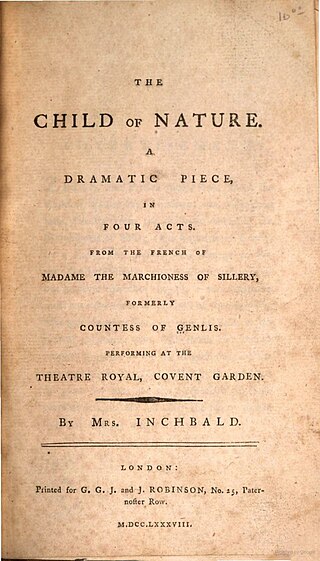
The Child of Nature is a 1788 comedy play by the English writer Elizabeth Inchbald, adapted from a French work by the Countess de Genlis. It premiered at the Theatre Royal, Covent Garden in London on 28 November 1788. The original cast included Thomas Ryder as Duke Murcia, William Farren as Marquis Almanza, William Thomas Lewis as Count Valantia, James Fearon as Seville, William Macready the Elder as Granada, Francis Aickin as Peasant, Isabella Mattocks as Marchioness Mérida and Ann Brunton Merry as Amanthis. The Dublin premiere took place at the Crow Street Theatre on 13 February 1789.
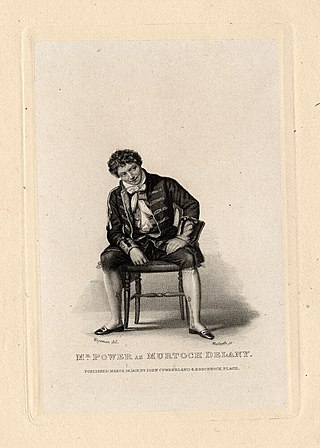
The Irishman in London is a 1792 comedy play by the Irish writer and actor William Macready the Elder. A farce, it premiered as an afterpiece at the Theatre Royal, Covent Garden in London on the 21 April 1792. The original cast included George Davies Harley as Captain Seymour, Macready as Colloony, Joseph Shepherd Munden as Frost, John Henry Johnstone as Murtoch Delany, John Fawcett as Edward, Thomas Blanchard as Cymon, Isabella Mattocks as Louisa and Charlotte Chapman as Caroline. The Irish premiere took place at the Crow Street Theatre in Dublin on 19 July 1792.
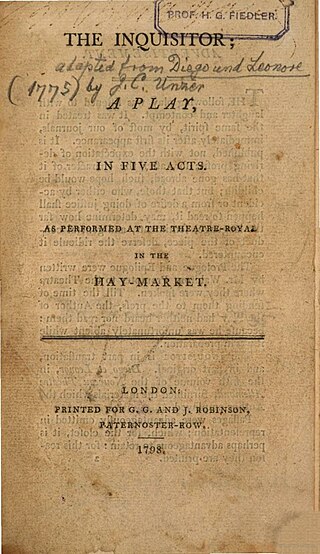
The Inquisitor is a 1798 play by the British writer Thomas Holcroft. It was inspired by the 1775 play Diego und Leonore by Johann August Unzer. It premiered at the Theatre Royal, Haymarket in London on 23 June 1798. The original cast included James Aickin as The Patriarch, Henry Erskine Johnston as Alberto, William Barrymore as Francisco, Charles Kemble as Fernando, Robert Palmer as Lelio, Thomas Caulfield as Alguazil, Maria Theresa Kemble as Leonora, Elizabeth Heard as Violante and Sarah Harlowe as Licia.
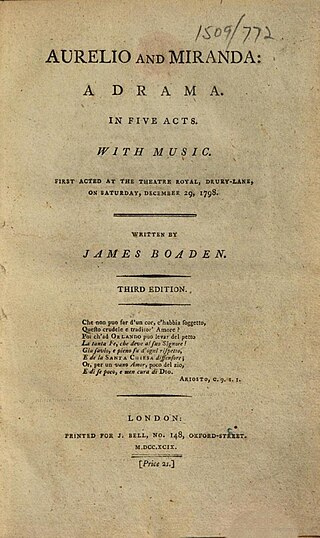
Aurelio and Miranda is a 1798 play by the British writer James Boaden, inspired by Matthew Gregory Lewis 1796 novel The Monk. It premiered at the Theatre Royal, Drury Lane on 29 December 1798. The original cast included John Philip Kemble as Aurelio, Sarah Siddons as Miranda, William Barrymore as Raymond, Charles Kemble as Lorenzo, John Bannister as Christoval, Walter Maddocks as Hilario, Ralph Wewitzer as Pedro, Jane Powell as Agnes, Charlotte Tidswell as St. Agatha, Maria Bland as Zingarella, Sarah Sparks as Leonella and Elizabeth Heard as Antonia.

The Voice of Nature is an 1802 historical play by the British writer James Boaden. It premiered at the Theatre Royal, Haymarket in London on 31 July 1802. It was inspired by the melodrama Le Jugement de Salomon by the French playwright Louis-Charles Caigniez. The Irish premiere took place at the Crow Street Theatre in Dublin on 21January 1806. The original Haymarket cast included William Barrymore as Alphonso, King of Sicily, Charles Kemble as Rinaldo, John Waddy as Gareb, Robert Palmer as Riccardo, Catherine St Ledger as Alzira, Maria Gibbs as Lilla and Mary Ann Davenport as Bendetta.




















